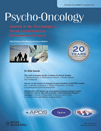A community-based approach to cancer counselling for patients and carers: a preliminary study
Abstract
Objective: The delivery of psychological care services to people with cancer and their carers is a key clinical priority that has yet to be broadly implemented. The present study aimed to provide guidance for service provision by describing a community-based intervention approach; outlining the characteristics, psychological concerns, and distress outcomes for people who utilise the service.
Methods: Over a 3-year period 681 patients and 520 significant others referred from a community-based Cancer Helpline received tele-based psychosocial interventions.
Results: In this case series presenting problems varied between patients and significant others, with significant others reporting higher levels of distress (p<0.001). Both patients and significant others experienced decreases in distress over the period of the intervention (p<0.001).
Conclusions: This study provides level IV evidence that the tele-based intervention for cancer-related distress is an effective approach to service delivery. A randomised control trial is currently underway to assess the effectiveness of this approach. Copyright © 2010 John Wiley & Sons, Ltd.




